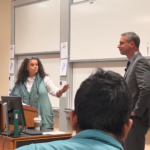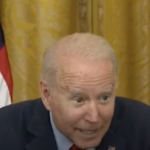When the Democrats and Russians Opposed Reagan


“It is preposterous to believe that the Russians had any effect on the outcome of voting in this country,” said Rush Limbaugh on “Fox News Sunday.” Nevertheless, Republican-led congressional committees have already been stampeded into opening investigations into whether President Trump was Russia’s candidate in the 2016 presidential election.
Accuracy in Media (AIM) raised concerns about the influence of Russian propaganda on the U.S. political process more than four years ago, when Russia Today (RT) television was trying to disrupt the Republican presidential primary. Going further back into history, the Moscow-funded Communist Party USA (CPUSA) was openly advocating the defeat of Republican President Ronald Reagan in 1984.
A good place to start this inquiry is a quarter-page ad that appeared in The New York Times on August 19, 1984, entitled, “The Bottom Line: NO to Reaganism.” It was an anti-Reagan diatribe under the byline of the then-CPUSA vice presidential candidate, longtime pro-Russian communist Angela Davis. She said, “…if Reagan is not defeated in November we may well be on the way to war—and even a nuclear holocaust.”
Though running on the CPUSA ticket, she praised the Democrats for nominating Geraldine Ferraro as the first female vice-presidential candidate of a major party, and said that Jesse Jackson’s campaign for president had moved the Democrats “in a more progressive direction.”
This is the same Angela Davis who appeared as a co-chair and spoke at the anti-Trump Women’s March on Washington on January 21.
The CPUSA ad in The New York Times was an obvious signal that the Kremlin didn’t want Reagan re-elected as U.S. president. But The New York Times took the money for the ad and moved on, rather than use the ad as an opportunity to expose Moscow’s involvement in the anti-Reagan campaign.
Despite this opposition, Reagan won a stunning re-election victory, carrying 49 of the 50 states over the Democratic candidate, former Vice President Walter Mondale.
Earlier that year, the CPUSA paper, the Daily World, had run a banner headline, “Fight to Sharpen Dems’ Platform,” on how progressives were working to improve the “peace” and “rights” planks of the Democratic national platform. By August, the Daily World was highlighting how unity at the Democratic Party convention had shifted the odds toward a defeat of Reagan in November. The story quoted Gus Hall, general secretary and presidential candidate of the CPUSA, as saying that “it is necessary to pay special attention to the issues and forms that will unite and bring together the supporters of Mondale and the supporters of Jackson.”
Earlier, Davis had given an interview to the CPUSA paper, denouncing “the ideological myth of the Soviet menace” and the anti-communist policies of President Reagan. She described the CPUSA as “a part of the united people’s front that will be able to defeat the Reagan Administration.”
By September of 1984 the Russians were openly expressing their sympathies, marked by Soviet Foreign Minister Andrei A. Gromyko meeting with Walter Mondale. The meeting was designed to highlight a Soviet propaganda theme that Reagan was responsible for a breakdown in arms-control negotiations.
The Advanced International Studies Institute, associated with the University of Miami, analyzed Soviet propaganda themes, demonstrating that the Soviets were “calculating how to most effectively damage President Reagan’s reelection efforts.”
In July 1984, the Heritage Foundation released a detailed analysis of how Soviet propagandists were aiming at Reagan’s ouster. A study by Manfred R. Hamm declared, “Moscow’s disinformation campaign has been aimed at convincing American, European, and world opinion that U.S. military and political policies are the root cause of international conflict and instability.”
Reagan was opposed because the Soviets/Russians perceived him to be an ideological conservative committed to restoring America’s economic and military strength. At the time, the Democrats and the Russians backed the so-called “nuclear freeze campaign” to undercut Reagan’s military build-up.
By any objective measure, Trump’s campaign proposals to rebuild America’s economic and military strength are more of a threat to Moscow than anything Democratic President Hillary Clinton had proposed. Yet it’s Trump who stands accused in the media and by the Democrats of being an agent of Russian influence.
Indeed, Republican Senator Richard Burr (NC), Chairman of the Senate Select Committee on Intelligence, has joined with Democratic Senator Mark Warner (VA), Vice Chairman of the Senate Select Committee on Intelligence, in announcing an “inquiry into Russian intelligence activities” regarding U.S. elections.
It appears that the investigation will be limited to counterintelligence concerns related to Russia and the 2016 U.S. election, which lets the Democrats off the hook for what they did to assist the Soviets/Russians in their campaign against Republican President Reagan.
Any objective inquiry should also look at how Angela Davis, a longtime pro-Russian communist, became a leading opponent of President Trump and co-chair of the Women’s March on Washington, an event that featured several Democratic Party politicians in addition to vulgar Hollywood celebrities.
“If you’re going to protest a new president famously accused of being a tool of Russian strongman Vladimir Putin, common sense would suggest avoiding high-profile speakers who were proud tools of Putin’s former employer, the Soviet Union,” comments libertarian conservative writer Cathy Young, referring to Davis. She added that “…the rhetoric of the anti-Trump ‘resistance’ often portrays him [Trump] as being in cahoots with Vladimir Putin, or even as a Kremlin puppet. Yet the same resistance is honoring a woman who ran for political office in the United States on the ticket of a party that was quite literally a wholly owned subsidiary of the Kremlin.”
The Senate Subcommittee on Internal Security (now defunct) report, “Communist Party, USA—Soviet Pawn,” is a good source of information on how the CPUSA served as nothing more than a branch of the Russian Communist Party and was funded and sponsored by Moscow.
The bizarre spectacle of Angela Davis now surfacing as a leader of the anti-Trump resistance, dedicated to exposing Trump’s relationship with Moscow, is an indication that the Russian angle, regarding the current administration, is fraudulent. But with Republicans like Senator Burr going along with the call for hearings, the Democrats and the media can count on getting more mileage out of a controversy that was manufactured in part by President Obama’s CIA.
In a bizarre twist, it turns out that Obama’s CIA director, John Brennan, admitted voting for Gus Hall in 1976 when Hall was the CPUSA presidential candidate in that election year as well.
Since 1984, when the party fielded the Hall/Davis ticket but backed the Democrats, the CPUSA has not offered candidates for president and vice president. Instead, the party of “Red Russia” and a “Soviet America” openly backed Obama in 2008 and 2012, and Hillary in 2016.
The idea that Trump was favored by the Russians doesn’t square with the evidence that Russian communists and their agents have been backing the Democratic Party and its candidates since the days of Reagan.
But will the Senate and House intelligence committees examine that evidence?
Cliff Kincaid is the Director of the AIM Center for Investigative Journalism, and can be contacted at cliff.kincaid@aim.org




